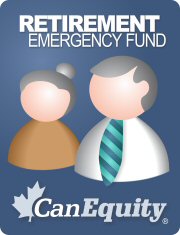According to an Ipsos Reid Retirement Risk survey conducted earlier this year, roughly 72 per cent of Canadians approaching retirement are concerned over how they will maintain a comfortable standard of living through their retirement years. Most Canadians are additionally anxious that their savings will not be sufficient in covering needed health care expenses.
Sun Life Financial spoke to two experts in the finance field – Jim Yih, author of 10 Things I Wish Someone Had Told Me About Retirement and Gail Bebee, author of No Hype – The Straight Goods on Investing Your Money – who recommended the following tips on building, and maintaining, your emergency retirement fund.
- Pad your budget: As much as is possible, try to raise the retired monthly income amount you can allot yourself above that which is actually required. These added funds will act as a savings cushion for the months when your regular budget is exceeded.
- Accumulate assets: Build up your Tax Free Savings Account. The TFSA is an excellent vehicle to use as a contingency fund, namely because you will not incur the tax ramifications you would if using an RRSP or other registered account from which to access extra funds. High interest savings accounts and TFSAs will grow with you and provide a healthy financial place from which to draw needed emergency moneys.
- Posit the line of credit: A low-interest line of credit tied to your home, or independent thereof, can act as a great contingency account in times of need, but only for the financially disciplined. If you track your spending carefully and are stringent in your budgeting, you could use this account to pay for emergencies and, in turn, pay them off with other savings over time. To do this successfully, however, you would have to be able to locate areas in your budget from which you can afford to shave off your LoC payments.
- Pay off as much as much as possible before you retire: Sounds straightforward, but it’s a key item that many Canadians are neglecting to do. Once you are on a fixed income debt repayments become a major hindrance on your budget. The last thing you want your retirement dollars consumed by is interest. Focus first on any high interest debts you have left outstanding, get all of your credit card balances down to 0 and, if possible, as much of your mortgage paid down as you can. The lower your monthly expenditures, the more you will have left over for emergencies.
- Be cognizant of prospective tax-related expenses: Now that you are employed you are most likely used to receiving a pay cheque from one source, from which all of your income tax is deducted. Once you retire however, your income will be derived from several smaller cheques from various sources, such as Old Age Security, Canada Pension Plan, company pension payouts or other sources. These cheques will only deduct tax relative to the amount they pay you, not the amount total you receive from all sources. This means that at the end of the year, when all of your income is added up, it may be that you are tax-owing. To tackle this issue you have two options: inquire and look into increasing the amount of tax withheld by one or more of your income sources, or, when the time comes, arrange a tax installment payment plan with the Canada Revenue Agency. In both cases, you will need incorporate additional tax payment into your monthly budget.

